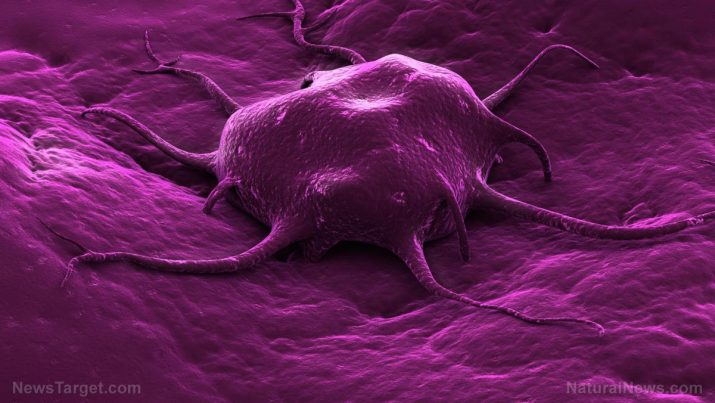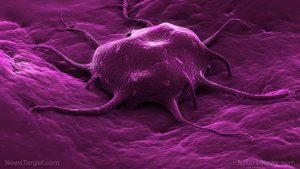
Hereditary nonpolyposis colorectal cancer – causes, side effects and treatments at NaturalPedia.com
Saturday, June 16, 2018 by Ralph Flores
http://www.naturalpedia.com/hereditary-nonpolyposis-colorectal-cancer-causes-side-effects-and-treatments-at-naturalpedia-com.html

Hereditary non-polyposis colorectal cancer (HNPCC), more commonly known as the Lynch syndrome (LS), is an inherited condition that predisposes a person to certain types of cancer. In particular, those with HNPCC are more likely to develop colorectal cancer, as well as breast, ovarian, small bowel (intestinal), pancreatic, prostate, urinary tract, liver, endometrial (uterine), kidney, and bile duct cancers. HNPCC is one of most common inherited cancer syndromes – at least one in 300 people is a potential carrier of the gene associated with the condition.
HNPCC-related cancers normally develop at a young age, and some people develop different types of cancers during their lifetime. In particular, up to five percent of all colorectal cancer diagnoses are believed to have come from HNPCC.

Known risk factors and symptoms of hereditary nonpolyposis colorectal cancer
The condition is passed down as an autosomal dominant condition: If one parent carries the gene mutation of HNPCC, the likelihood that each of his or her offspring will have it is increased by 50 percent.
For the most part, symptoms of HNPCC are similar to that of colorectal cancer. In its early stages, the condition is asymptomatic; however, as it progresses, the following can be observed.
- Presence of blood in the stool
- Diarrhea
- Persistent constipation
- Abdominal pain
- Change in bowel habits
- A decrease in the size and caliber of stools
- Distention
- Unexpected weight loss
- Vomiting, sometimes accompanied by lethargy
Body systems affected by hereditary nonpolyposis colorectal cancer
One of the complications of HNPCC is the progression of the polyps into certain cancers and even metastasize. If the polyps rupture, these may bleed and cause anemia.
Food items or nutrients that may prevent hereditary nonpolyposis colorectal cancer
HNPCC is an inherited condition and cannot be attenuated with food items and nutrients. However, these can prevent it from developing into cancer. Some suggested food items include:
- Ginseng – It contains a hefty amount of antioxidants, which prevent the spread of cancer cells. It can even cause these cells to die in a process called apoptosis. To take advantage of its benefits, brewing ginger tea is recommended.
- Green tea – The catechins and epicatechins that are present in green tea are known to attenuate free radical damage, lowering the risk of cancer. It’s also hailed to have cancer-inhibiting and anti-tumor effects.
- Garlic – The active ingredient in garlic, allicin, is known to prevent the spread of cancerous cells without damaging it.
- Flaxseed oil – The omega-3 fatty acids in flaxseed oil reduce overall inflammation throughout the body and prevent the spread of cancer.
- Salmon and other oily fish – These are also rich sources of omega-3 fatty acids and antioxidants, both of which defend against cancer.
- Blueberries – The antioxidants found in blueberries not only inhibit free radical activity, it also prevents cell mutation, which triggers the growth of abnormal cancer cells.
- Spinach – Fiber, a compound abundantly found in spinach, prevents constipation and hemorrhoids, which can aggravate colon cancer.
- Olive oil – The phenolic content of olive oil increases enzyme production to prevent cancerous invasion.
- Turmeric – In particular, curcumin – the active ingredient in turmeric – is packed with antioxidants which prevent the development of cancer cells.
Treatment and management options for hereditary nonpolyposis colorectal cancer
Likewise, there are natural ways to manage HNPCC, so that it does not progress into cancer. These include:
- Increasing exercise. Having consistent and moderate physical activity is beneficial for a person’s health and well-being. On average, setting aside at least 30 minutes a day to physical activity can reduce the risk of certain cancers. If a person has already been diagnosed with cancer, exercise is still beneficial in boosting metabolism and supporting the immune system.
- Quitting smoking. While smoking increases the risk of getting multiple types of cancer, for HNPCC, it increases the speeds at which polyps develop in the colon, which could be cancerous.
- Avoiding caffeine.
- Increasing water intake to six to eight glasses a day.
- Doing mind-body therapies such as yoga, qigong, and meditation.
- Acupuncture and acupressure. It relieves the other symptoms such as vomiting and nausea.
Where to learn more
- Black raspberries prevent colorectal cancer
- Six easy daily habits that will reduce your risk of colorectal cancer by half
- Drinking coffee may decrease the risk of colon cancer
- Curcumin halts colorectal cancer, breast cancer by inducing death of cancer cells
- Study Suggests Vitamin D Improves Survival From Colorectal Cancer
Summary
Hereditary non-polyposis colorectal cancer (HNPCC) is an inherited condition that predisposes a person to certain types of cancer.
HNPCC is more likely to develop colorectal cancer, while in some cases it could also become breast, ovarian, small bowel (intestinal), pancreatic, prostate, urinary tract, liver, endometrial (uterine), kidney, and bile duct cancers.
HNPCC is one of most common inherited cancer syndromes.
HNPCC is an autosomal dominant condition.
HNPCC symptoms are similar to that of colorectal cancer.
Sources include:
Tagged Under: Tags: hereditary nonpolyposis colorectal cancer





